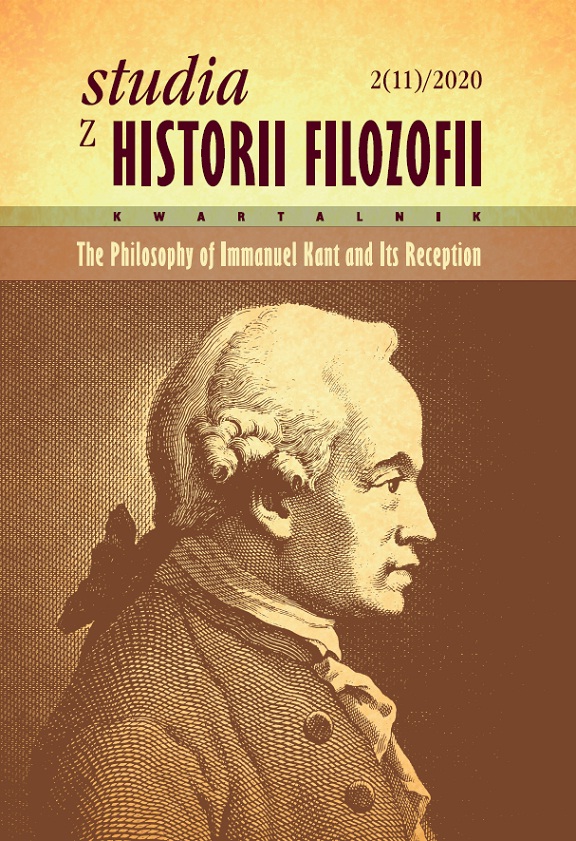Morality as the Destiny of Human Being in the Philosophy of Kant and in the Age of German Enlightenment
DOI:
https://doi.org/10.12775/szhf.2020.012Słowa kluczowe
Kant, Wolff, Spalding, morality, religion, human being, man, mankind, destinyAbstrakt
The paper concerns the issue of destination of human being and humanity in the philosophy of Kant and in the philosophy of German Enlightenment in general. In the philosophy of Kant the problem of destination of man runs throughout all his main writings from the pre-critical writings until the later work Religionsschrift. Kant pointed out that a human is a unique kind of being because of freedom of will, which allows for the moral dimension. It is this capacity of morality that becomes a bridge to religion. Very close to this point of view was J.J. Spalding, whose writing “The Destiny of Man” opened the discussion of the issue of man’s destination. Similar ideas, though differently expressed, we find in the works of Christian Wolff, that although morality does not depend on the will of God and thus can be derived from the nature of man and the world, the highest and most genuine degree of virtue, possible for a human being, inevitably leads to faith in God. It can be concluded that in these aspects of his philosophy Kant reflected the trend and features which were characteristic for the Age of German Enlightenment both Late as well as Early.
Bibliografia
Albrecht Michael. 1985. “Einleitung”. In: Wolff Christian. Rede über die praktische Philosophie der Chinesen. Ed. Michael Albrecht. IX–LXXXVIII. Hamburg: Felix Meiner Verlag.
Beutel Albrecht. 2003. “Johann Joachim Spalding. Populartheologie und Kirchenreform im Zeitalter der Aufklärung”. In: Theologen des 17. und 18. Jahrhunderts: konfessionelles Zeitalter, Pietismus, Aufklärung. Ed. Peter Walter, Martin Jung. Darmstadt: Wissenschaftliche Buchgesellschaft.
Beutel Albrecht. 2006. “Aufklärung des Geistes. Beobachtungen zu Spaldings Pfingstpredigt ‘Der Glaube an Jesum, als das Mittel zur Seeligkeit’”. In: Christentum im Übergang. Neue Studien zu Kirche und Religion in der Aufklärungszeit. Ed. Albrecht Beutel, Volker Leppin, Udo Sträter. Leipzig: Evangelische Verlagsanstalt.
Beutel Albrecht. 2006. Aufklärung in Deutschland. Göttingen: Vandenhoeck & Ruprecht.
Bissinger Anton. 1986. “Zur metaphysischen Begründung der Wolffschen Ethik”. In: Christian Wolff 1679–1754. Interpretationen zu seiner Philosophie und deren Wirkung. Mit einer Bibliographie der Wolff-Literatur. Ed. Werner Schneiders. 148–160. Hamburg: Felix Meiner Verlag.
Böckerstette Heinrich. 1982. Aporien der Freiheit und ihre Aufklärung durch Kant. Stuttgart-Bad Cannstatt: Frommann-Holzboog.
Habichler Alfred. 1991. Reich Gottes als Thema des Denkens bei Kant. Entwicklungsgeschichtliche und systematische Studie zur kantischen Reich-Gottes-Idee. Mainz: Matthias-Grünewald-Verlag.
Kant Immanuel. 1987. Critique of Judgment. Trans. Werner Pluhar. Indianapolis, Cambridge: Hackett Publishing Company.
Kant Immanuel. 1998. Critique of Pure Reason. Trans. and ed. Paul Guyer, Allen Wood. Cambridge: Cambridge University Press.
Kant Immanuel. 1998. Religion within the Boundaries of Mere Reason. Transl. Allen Wood, George di Giovanni. Cambridge: Cambridge University Press.
Kant Immanuel. 2011. Groundwork of the Metaphysics of Morals. Transl. Mary Gregor, Jens Timmermann. Cambridge: Cambridge University Press.
Kant Immanuel. 2018. “Natural right course lecture notes by Feyerabend”. In: Lectures and Drafts on Political Philosophy. Transl. Fred Rauscher. 73–180. Cambridge: Cambridge University Press.
Klemme Heiner. 2018. “Der Grund der Verbindlichkeit. Mendelssohn und Kant über Evidenz in der Moralphilosophie (1762/64)”. Kant-Studien 109, 2: 286–308.
Macor Laura Anna. 2012. “Die Abhängigkeit des Menschen von Gott. Zur Endlichkeit als Geschöpflichkeit bei Johann Joachim Spalding”. In: Endlichkeit und Transzendenz. Perspektiven einer Grundbeziehung. Ed. Jakub Sirovátka. Hamburg: Felix Meiner Verlag.
Macor Laura Anna. 2013. Die Bestimmung des Menschen (1748–1800). Eine Begriffsgeschichte. Stuttgart-Bad Cannstatt: Frommann-Holzboog.
Opocher Tommaso. 2013. Christian Wolff. Filosofo del diritto e della politica. Milani: CEDAM.
Raatz Georg. 2014. Aufklärung als Selbstdeutung. Johann Joachim Spaldings “Bestimmung des Menschen” (1748): eine genetisch-systematische Rekonstruktion. Tübingen: Mohr Siebeck.
Schneiders Werner. 1983. Aufklärung und Vorurteilskritik. Studien zur Geschichte der Vorurteilstheorie. Stuttgart-Bad Cannstatt: Frommann-Holzboog.
Schollmeier Josef. 1967. Johann Joachim Spalding. Ein Beitrag zur Theologie der Aufklärung. Gütersloh: Gütersloher Verlagshaus.
Spalding Johann Joachim. 1748. Die Betrachtung über die Bestimmung des Menschen. Greifswald: Struck.
Spalding Johann Joachim. 1785. Vertraute Briefe, die Religion betreffend. Breslau: Gottlieb Löwe.
Spalding Johann Joachim. 1806. Religion, eine Angelegenheit des Menschen. Berlin: Voss.
Tippmann Caroline. 2011. Die Bestimmung des Menschen bei Johann Joachim Spalding. Leipzig: Evangelische Verlagsanstalt.
Wolff Christian. 1743. Vernünfftige Gedancken von der Menschen Thun und Lassen, zu Beförderung ihrer Glückseeligkeit. Halle: Renger.
Wolff Christian. 1747. Vernünftige Gedanken von Gott, der Welt und der Seele des Menschen, auch allen Dingen überhaupt. Halle: Renger.
Wolff Christian. 1985. Rede über die praktische Philosophie der Chinesen. Ed. Michael Albrecht. Hamburg: Felix Meiner.
Pobrania
Opublikowane
Jak cytować
Numer
Dział
Statystyki
Liczba wyświetleń i pobrań: 973
Liczba cytowań: 0



